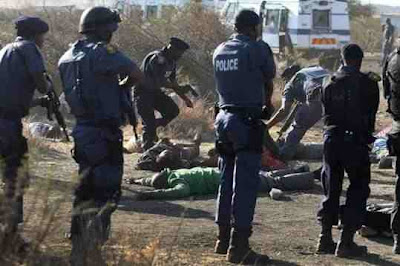Two union officials have been shot, one fatally, in an incident at the Lonmin-owned Marikana Platinum Mine in South Africa. Two gunmen initially opened fire on one of the officials outside the office of the National Union of Mineworkers (NUM) at the mine. When the official fled into the office his assailants pursued him and killed him. A second union official, described as a treasurer, confronted the men and was also shot, though not fatally. He is now in a critical condition in hospital having sustained six bullet wounds. The names of the officials have not been released.
A police vehicle at the Marikana Platinum Mine. Sky News.
The NUM has been involved in an ongoing dispute with a rival union, the Association of Mineworkers and Construction Union (AMCU) which has resulted in bloodshed on a number of occasions. Last month a negotiator from the AMCU was gunned down in a bar. The NUM is closely associated with the ruling ANC, and was heavily involved in the struggle against apartheid. However since the ANC came to power it has been accused of becoming to close to the mining companies, who the ANC need to remain on good terms with. The newer AMCU claim that workers in the mining industry are receiving considerably lower wages than they ought to be able to expect, and have organized a string of strikes across the sector, brining a number of mining companies to the negotiating table, but also resulting in some violent clashes with the police and members of other political organizations. In August 2012 police opened fire on AMCU workers at a rally at the Marikana Mine, killing at least 34 people.
See also At least 10 South African miners injured by rubber bullets in confrontation at Rustenburg mine, Pregnant woman killed in rioting over Tanzania gas pipeline, Uranium mining to begin in Tanzania and Massacre at Lonmin Marikana Platinum Mine, Rustenburg, South Africa.
Follow Sciency Thoughts on Facebook.




